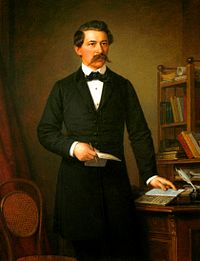The Bards of Wales

The Bards of Wales (Template:Lang-hu) is a ballad by Hungarian poet János Arany, written in 1857. Alongside the Toldi trilogy it is one of his most important works.
History
Arany was asked to write a poem of praise for the visit of Franz Joseph I of Austria, as were other Hungarian poets. Arany instead wrote about the tale of the 500 Welsh bards sent to the stake by Edward I of England for failing to sing his praises at a banquet in Montgomery Castle. The poem was intended as a metaphor to criticise the Habsburg rule over Hungary after the Hungarian Revolution of 1848. It was a method of passive resistance to the repressive politics of Alexander von Bach in Hungary, and the planned visit of the monarch.[1][2]
Poem

The poem was written "for the desk drawer" and was first published six years later in 1863, disguised as a translation of an Old English ballad, in order to evade censorship.
The poem is considered to be a manifesto of the passive resistance which led to the Austro-Hungarian Compromise of 1867. Arany wrote his own preface to the poem:
The historians doubt it, but it strongly stands in the legend that Edward I of England sent 500 Welsh bards to the stake after his victory over the Welsh (1277) to prevent them from arousing the country and destroying English rule by telling of the glorious past of their nation.[2]
The royal form of bardic tradition ceased in the 13th century, when the 1282 Edwardian conquest permanently ended the rule of the Welsh princes. The legendary suicide of The Last Bard (c. 1283), was commemorated in this poem from 1857, as a way of encoded resistance to the suppression of the Habsburg politics of his own time.[2]
The best-known English translation was made by Canadian scholar Watson Kirkconnell in 1933.[2]
In September 2007 an English copy of this poem, translated by Peter Zollman, was donated to the National Library of Wales in Aberystwyth.[2]
In culture
In the 6th grade of elementary school, every Hungarian student is required to learn "The Bards of Wales" as it has an important role in both Hungarian history and literature.[2]
The poem has been set to music by Hungarian folk metal band Dalriada in 2003. It was re-recorded and re-released in 2004 and in 2009 on Arany-album, which also has several of his other poems.
The Welsh composer Karl Jenkins wrote a cantata of the Zollman translation of the poem in 2011.
In 2012 it was announced that a Hungarian version of the Welsh Gorsedd Circle could be set up in Hungary as a symbol of strengthening relationships between Wales and Hungary, and in commemoration of "The Bards of Wales". The circle would consist of 13 stones, each representing one martyr bard.[2] .
References
- ^ http://www.mek.iif.hu/porta/szint/human/szepirod/magyar/arany/bardeng.hun
- ^ a b c d e f g Crump, Eryl (2012-08-07). "Strengthening the link between Wales and Hungary". WalesOnline. Retrieved 2012-08-07.
Other sources
- The Bards of Wales in the Hungarian Electronic Library
- An alternate translation from Bernard Adams
- Peter Zollman's English translation
- Rory Leishman, a Canadian Bard of Wales
- What The Bards of Wales means to a Hungarian-American
- The manuscript of the poem
- The Bards of Wales, translated to English by Watson Kirkconnel
